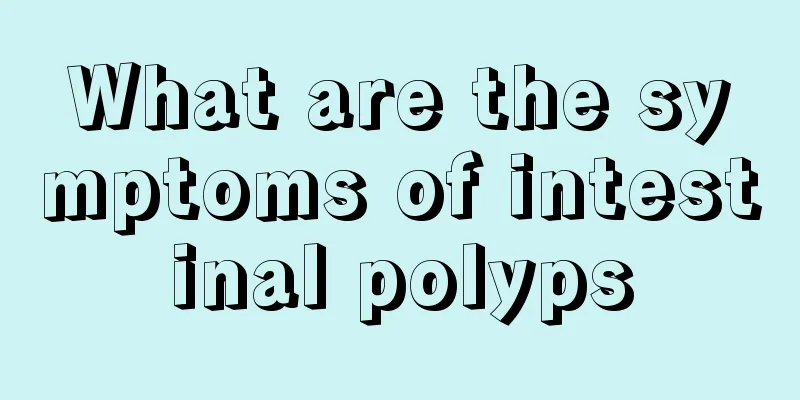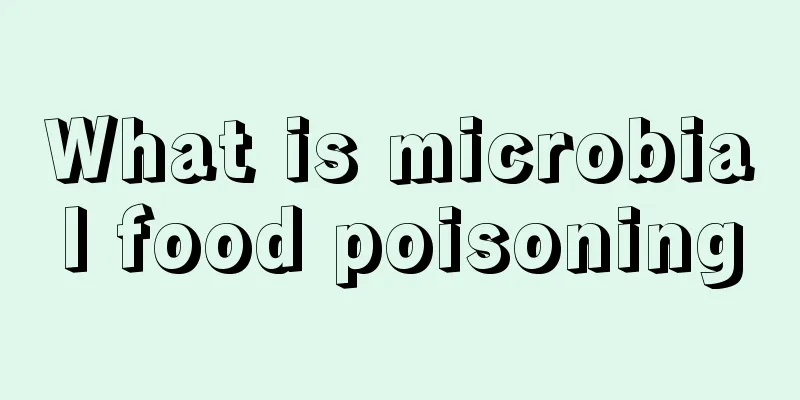What are the symptoms of intestinal polyps

|
Intestinal polyps mean that there is a problem with the patient's intestines. Intestinal polyps are often related to inheritance, inflammatory hyperplasia after suffering from some diseases, external environmental influences, and daily eating habits. The symptoms of intestinal polyps may sometimes be similar to those of other diseases, so they are easily ignored, resulting in missing the best time for treatment. 1. Blood in the stool Patients with colon polyps will have intermittent blood in the stool or blood on the surface of the stool. The color of the blood is mostly bright red. If secondary inflammatory infection occurs, mucus or bloody mucus in the stool may appear. Patients will have tenesmus, or even constipation or increased frequency of bowel movements. If the polyp is located close to the anus, the polyp may protrude from the anus. 2. Changes in bowel habits Changes in bowel habits mainly include changes in the frequency and timing of bowel movements, or unexplained constipation or diarrhea. If constipation and diarrhea occur alternately, you must pay attention, as this may be a manifestation of colon polyps. 3. Abnormal stool characteristics For normal people, the stool should be round in shape, but for patients with colon polyps, the stool may become thinner or flat due to the squeezing of the polyps, and sometimes even contain blood. 4. Abdominal pain This situation is relatively rare in patients with colon polyps. Generally speaking, it occurs in patients with more severe colon polyps. Larger polyps can cause intussusception, resulting in intestinal obstruction and abdominal pain. 5. Prolapse When polyps are large or numerous, gravity pulls on the intestinal mucosa, causing it to gradually separate from the muscle layer and prolapse downward. The traction caused by the patient's defecation movement and the stimulation of intestinal peristalsis can relax the mucosal layer around the base of the rectum, which may lead to rectal prolapse. 6. Intestinal irritation symptoms When intestinal peristalsis pulls on polyps, intestinal irritation symptoms may occur, such as abdominal discomfort, abdominal pain, diarrhea, bloody stools, tenesmus, etc.! |
<<: What are the symptoms of gastrointestinal disorders
>>: What is the function of vaccine refrigerator
Recommend
How much beer is appropriate to drink
Although beer is brewed from grains, drinking bee...
The feeling that quiet girls give to boys
Every girl has a different personality in life. I...
Mothball ingredients
Camphor balls are commonly used in many families....
What to do if your ears hurt when you dig them
The ears and belly buttons are areas of the human...
Dietary remedies for skin cancer patients
Skin cancer refers to a malignant tumor that occu...
What is the reason why children have difficulty falling asleep
There are many reasons why children have difficul...
How to relieve sinusitis attacks
Many patients will feel unbearable nasal congesti...
What are the causes of potassium deficiency and what should be done?
Now we are about to enter spring and summer, and ...
How long does it take to be discharged from the hospital after minimally invasive surgery for lung cancer
For a small number of patients, postoperative com...
How much does it cost to treat early-stage liver cancer
The early symptoms of liver cancer include obviou...
Necessity of interventional treatment for bronchial dilation
When treating a disease, the method is the most i...
What are the nursing methods for gallbladder cancer symptoms
Every year, tens of thousands of people suffer fr...
Suspension of study due to depression
Depression is a common mental problem. Many peopl...
There is a black patch of skin on my back, what's going on?
Some people find that some of the skin on their b...
Feeling of heaviness in the abdomen
Pregnant women always experience various discomfo...









